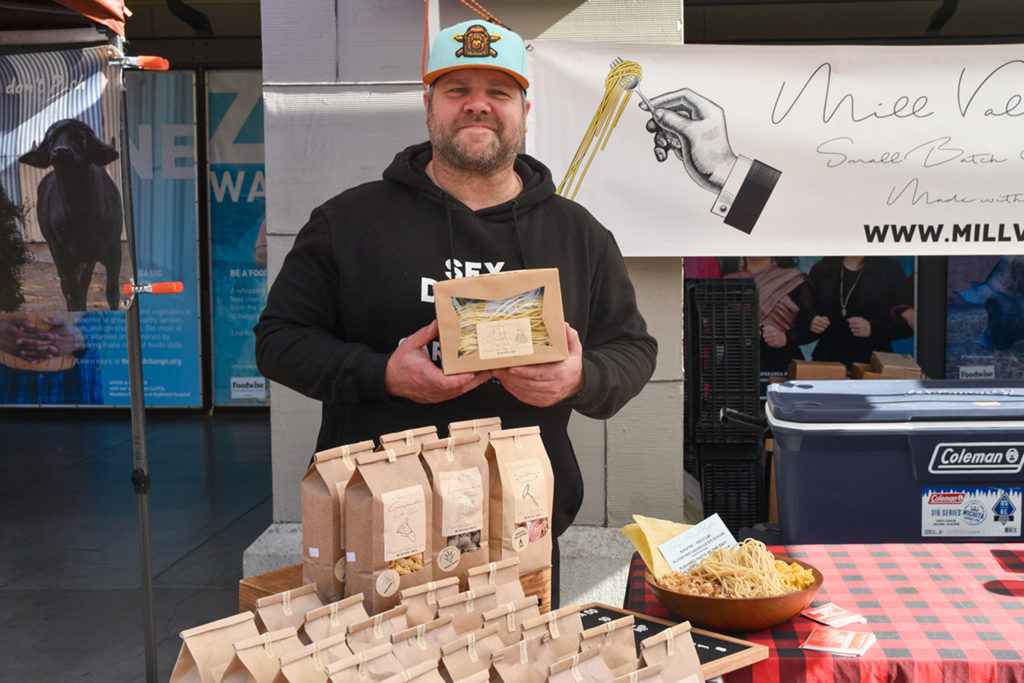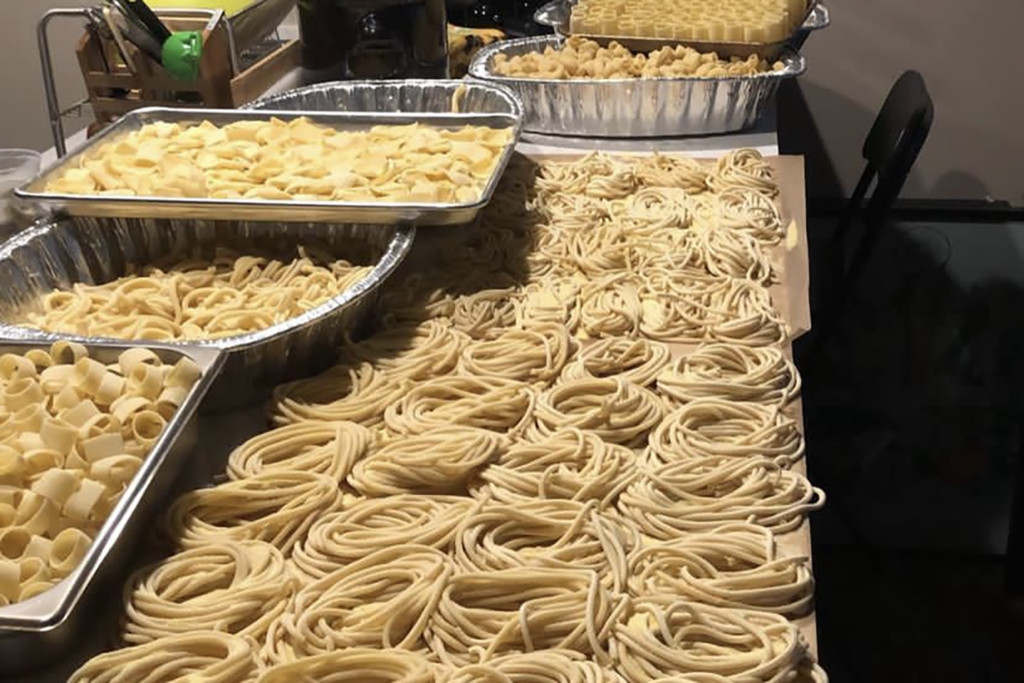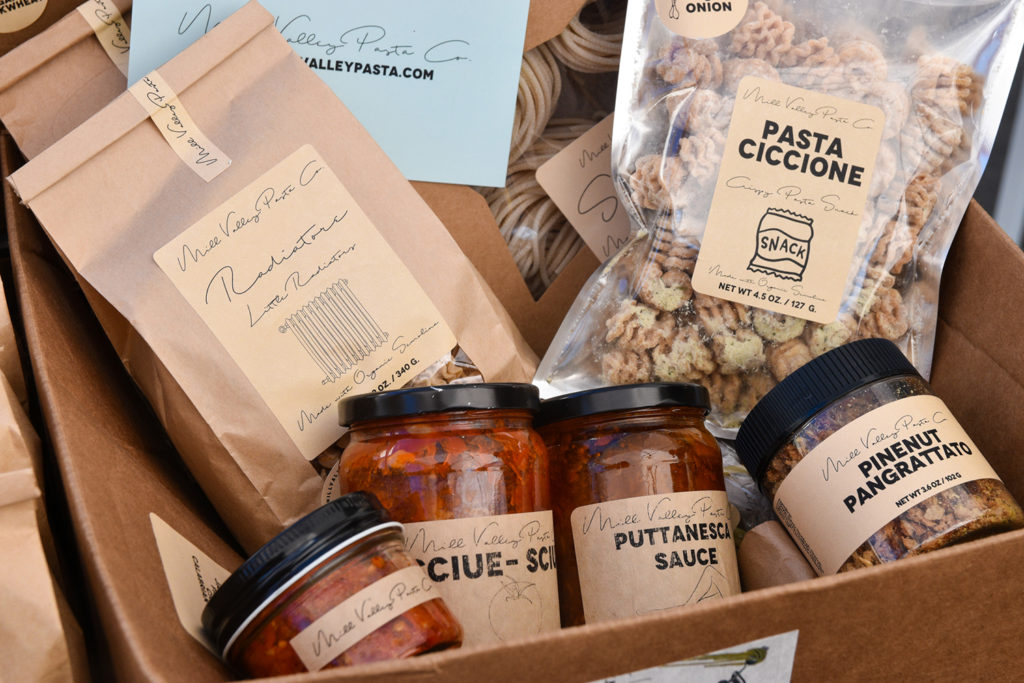After a Pandemic-Pivot, Chef Turns Farm-Fresh Ingredients into Artisan Pasta
Selina Knowles, Communications Coordinator
January 27, 2023

In 2020, chef and owner Tony Adams was a teaching chef in Sausalito, leading 200 cooking classes a year. Then came the pandemic. Like so many in the hospitality industry at the time, he found himself out of work and in need of something else to fill time. So he dusted off his vintage pasta maker and got busy making pasta.
From his Mill Valley apartment-turned-pasta-factory, virtual word-of-mouth helped Tony build the momentum to bring his budding pasta business to local farmers markets. Mill Valley Pasta Co. joined the Ferry Plaza Farmers Market at the end of 2022. He maintains relationships he’s built with local farms to create recipes that keep the focus on what’s fresh and local, putting only the best into his bronze-cut, air-dried pastas.

From Pastime Pasta Making to Neighborhood Networking
Previously, Tony had made pasta occasionally as a personal hobby, but in the isolation of shelter-in-place, pasta making became an outlet to connect with his neighbors. After putting up a signup sheet in his Mill Valley apartment complex (noting “that it was free, and that I wasn’t going to kill them, I promise!”), Tony received about a dozen signups from pasta-curious neighbors.
The following week, more than half of the recipients came back requesting more and offering to pay. Figuring that “30 bucks will pay the light bill this month,” Tony took the first step toward what would later grow into his business.
Good food sparks conversation, and during the time of quarantine, satisfied customers made use of social media to talk about this budding pasta maker. One of Tony’s neighbors posted about his pasta on Nextdoor and another in a local Facebook group, then all of the sudden, orders were rushing in.
Tony recalls, “It got to the point where I was making like 50 or 70 pounds of pasta a week in my apartment. My whole kitchen counters were full of those disposable turkey trays, which is what I would put the dried pasta in before I could package it.”
Tony, who was relatively new to Nextdoor, the online platform for neighborhood networking, says “I became involved with it just because it was a great way to connect with local people up the street that wanted pasta.” By the time he started at farmers markets in 2021, people recognized Tony from his online presence.
As word got out and the demand for Mill Valley Pasta Co. grew, so did Tony’s investment of time, money, and effort into what was originally a side project. When he was eventually called back into work, Tony resumed cooking classes at first, but his focus was split.
“I had built this other thing up, and I couldn’t let it go,” says Tony. Although he loves teaching, his lifelong passion for pasta and the investments he’d put into Mill Valley Pasta Co. smoothly paved the way for his next steps. “When I had to decide, it was a relatively easy decision to keep going with the thing that was mine.”

Finding Fresh Flavors from the Farmers Market
When picking ingredients and flavors, Tony takes a chef-driven approach, gravitating toward what’s fresh, local, and innovative. His pastas begin with a base of organic semolina flour from Keith Giusto Bakery Supply in Petaluma. The creative process often starts at the farmers market, where Tony sources the majority of his ingredients.
“The advantage of being a chef and having a chef relationship with these farms, prior to starting my pasta company, was understanding their product, knowing what they had available, knowing what they were good at, and then being able to go directly to them for those products for our pasta,” he explains.
To name a few, Tony champions Star Route Farms for pesto greens and chicken eggs, The Peach Farm for Meyer lemons, and Farmer Joy for duck eggs. “If I listed every farm we worked with on all of our packaging, I would need twice as much labeling as I have on every package,” says Tony.
Tony launched the pasta business with classics like Porcini and Saffron, but has since created some less traditional flavors that, in his words, some Italians might find upsetting. “We often get a little bit of kickback when true Italians make their way to the market,” he says. “They’re like, ‘You put beet in pasta—what are you doing, idiot? That would never happen in Italy.’”

Spiraling Into the World of Dried Pasta as a Small Business
After all the ingredients have been mixed into the dough, the process continues at the shape of the cut. The 30 unique pasta shapes that you can find from Mill Valley Pasta Co. are extruded through different Italian-made pasta dies, perforated metal plates on pasta machines that cut the dough into bucatini, fusilli, rigatoni, and other shapes.
After the pasta is cut, Tony takes great pride in air-drying all of the pasta. “I am the only person that is open air-drying their pasta, as far as I know,” says Tony. While air-drying is more time consuming, it’s a time-honored tradition that can lead to a texturally superior pasta.
To add pizzazz to any pasta dish, he also offers an array of small-batch, handmade pasta sauces, condiments, and seasonings such as puttanesca sauce, chile crisps, and bacon pangrattato (bread crumbs).
At Mill Valley Pasta Co.’s commercial kitchen in San Rafael, a small team makes everything happen. John, the “pastaio” (pasta maker), makes every piece of pasta, while Sam and Carl package everything that comes to the market. You can find Tony at farmers markets talking customers through the fresh pastas and seasonal fixings for the week.
He emphasizes that Mill Valley Pasta Co. is “not a nameless, faceless thing. We’re a local organization with local people living here,” and he delights in pointing to neighboring stalls at the farmers market when asked about ingredients for his pastas, sauces, and seasonings. “Even on the days when I feel like I don’t know what I’m doing, which is a lot of them,” Tony says with a chuckle, “we are confident we’re doing it the slow, right way.”
Support Mill Valley Pasta Co at the Ferry Plaza Farmers Market on Saturdays.
